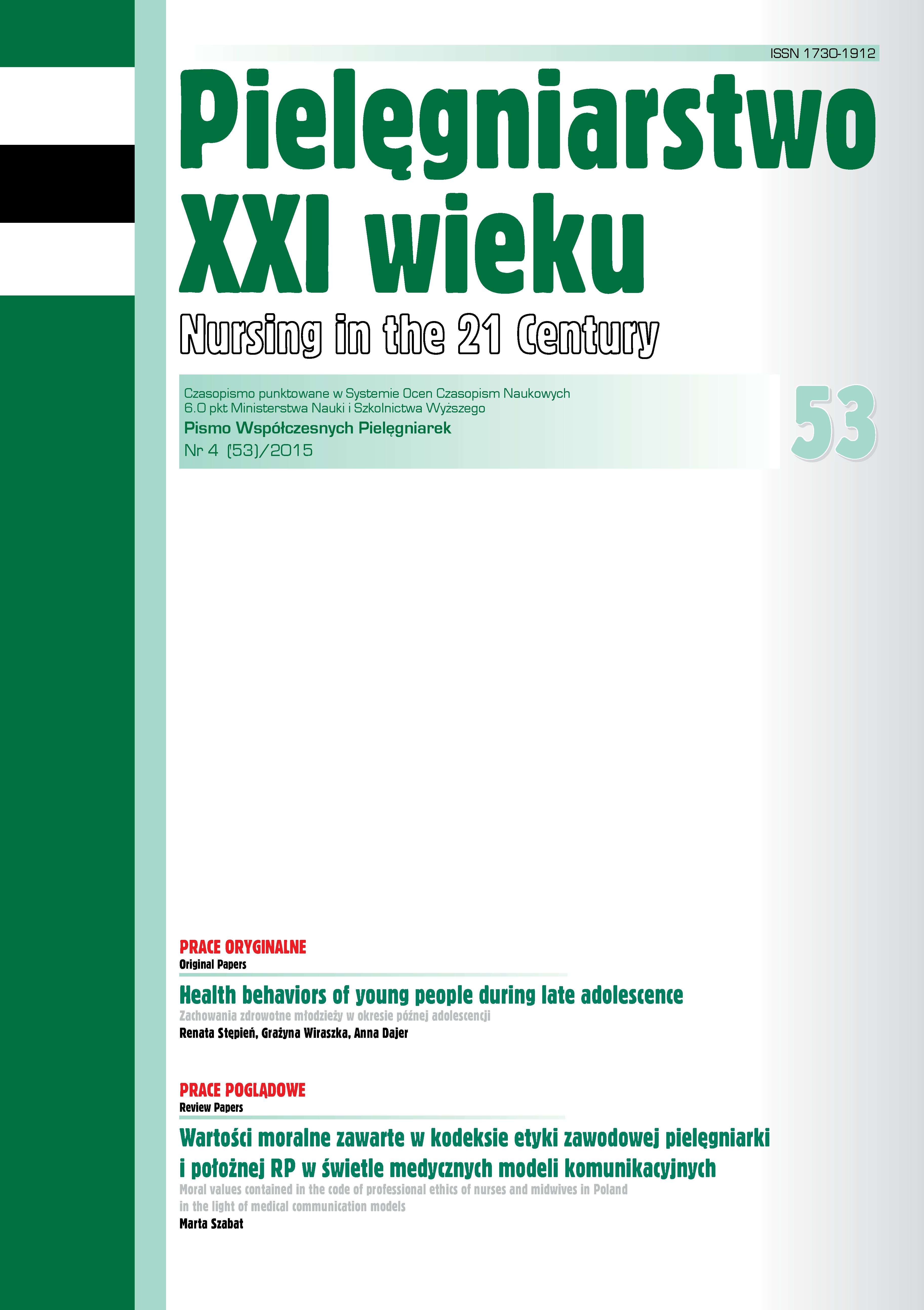The sense of life satisfaction of nursing students
DOI:
https://doi.org/10.12923/p21w-2015-4/54Keywords:
happiness, personal satisfaction, students, nursingAbstract
THE SENSE OF LIFE SATISFACTION OF NURSING STUDENTS
Aim. The aim of this study was to determine the degree of life satisfaction of nursing students and its determinants.
Material and Methodology. The study was performed by applying diagnostic survey, the questionnaire technique with the use of research tools in the form of: author’s questionnaire form, Subjective Happiness Scale by S. Lyubomirsky and H.S. Lepper, The Meaning in Life Questionnaire by M.F. Steger, P. Frazier, S. Oishii M. Kaler and Steen Happiness Index Questionnaire by M.P. Seligman, T.A. Steen, N. Park and C. Peterson. Statistical studies were carried out using the SPSS 17.0.0 software. The research comprised 90 full-time and part-time students at the faculty of nursing, Faculty of Health Sciences Collegium Medicum of Jagiellonian University.
Results. Studies have shown that most of the students declared lack of time to spend with family and friends; almost half of the respondents have no time to develop their interests and participate in sports, they devote most of the time to study. Despite this, the same group of students received scores above the midpoint on the scale of happiness, the meaning of life questionnaire and happiness questionnaire. Statistical analysis showed that student`s life satisfaction is influenced by the financial situation, sport, assessment of themselves as a student, course of study, time spent on learning, assessment of past life.
Conclusion. The majority of nursing students felt happines and satisfied with life.
References
1. Łosiak W. Psychologia emocji. Warszawa: Wyd. Akad. i Prof.; 2007.
2. Andruszkiewicz A, Banaszkiewicz M, Felsmann M, i wsp. Poczucie własnej skuteczności a wybrane zmienne związane z funkcjonowaniem zawodowym w grupie pielęgniarek. Probl. Piel. 2011; 2: 143-147.
3. Dalke J, Szulc A, Broniewska M, i wsp. Czym jest szczęście. Analiza i Egzystencja 2013; 21: 149-160.
4. Tatarkiewicz W. O szczęściu. Warszawa: Wyd. Nauk. PWN; 2012.
5. Lewis M, Haviland-Jones JM. Psychologia emocji. Gdańsk: Gdańskie Wyd. Psych.; 2005.
6. Krok D. Poczucie sensu życia jako mediator w związkach duchowości i eudajmonistycznego dobrostanu psychicznego. Psychologia Jakości Życia. 2012; 11 (2): 145-162.
7. Kossakowska M, Kwiatek P, Stefaniak T. Sens w życiu. Polska wersja kwestionariusza MLQ. Psychologia Jakości Życia. 2013; 2: 111-115.
8. Such J, Sugalska I. W poszukiwaniu sensu. Przegl. Relig. 2010; 4: 116-117.
9. Pervin LA. Psychologia osobowości. Gdańsk: Gdańskie Wyd. Psych.; 2005.
10. Lyubomirsky S, Lepper HS. A measure of subjective happiness: Preliminary reliability and construct validation. Soc. Indic. Res. 1999; 46: 137-155.
11. Kwestionariusze: www.sites.google.com/site/lkacz1/kwestionariusze [Data dostępu: 8.05.2014].
12. Kaczmarek Ł, Stanko-Kaczmarek M, Dombrowski S. Adaptation and Validation of the Steen Happiness Index into13 Polish. Pol Psychol Bull. 2010; 3: 98-104.
Downloads
Published
Issue
Section
License
Copyright (c) 2015 Joanna Zalewska-Puchała, Agata Sowa, Anna Majda, Iwona Bodys-Cupak (Autor)

This work is licensed under a Creative Commons Attribution 4.0 International License.




